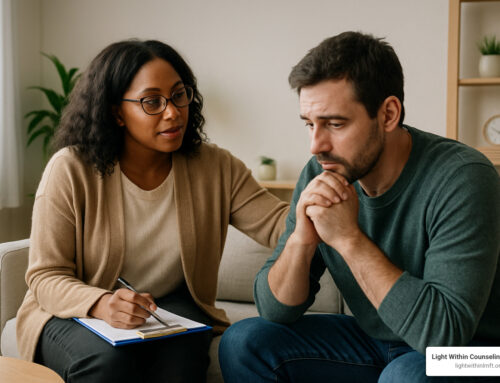Struggling with sleep is incredibly common, affecting millions of people across various age groups and lifestyles. Whether it’s trouble falling asleep, staying asleep, or waking up too early, sleep issues are something nearly everyone experiences at some point in their lives. Stress, anxiety, poor sleep habits, and even modern technology can all contribute to disrupted sleep patterns. It’s important to recognize that you’re not alone in this struggle—many people face similar challenges, and there are effective strategies and treatments available to help improve sleep quality. Here are some tips for optimizing our sleep with science-backed tips from Huberman Lab
Sleep is essential for both physical and mental well-being. However, many people struggle to achieve quality sleep due to anxiety, stress, and the impact of major life changes. Dr. Andrew Huberman, a neuroscientist and host of the Huberman Lab podcast, offers science-based strategies to enhance sleep quality, and here’s how you can integrate these tips into your life.
1. Establish a Consistent Sleep-Wake Schedule
Maintaining a regular sleep-wake schedule is one of the most effective ways to improve sleep.
Your body operates on a circadian rhythm, a natural 24-hour cycle that regulates sleepiness and wakefulness. By going to bed and waking up at the same time every day, even on weekends, you can synchronize your internal clock, making it easier to fall asleep and wake up naturally.
Huberman’s Insight: Dr. Huberman emphasizes that consistency in sleep timing not only improves sleep quality but also enhances cognitive performance and mood throughout the day.
2. Morning Light Exposure
Exposure to natural light in the morning is crucial for regulating your circadian rhythm. Morning sunlight helps set your internal clock, making it easier to fall asleep at night. Aim for at least 10-30 minutes of sunlight exposure within an hour of waking.
Huberman’s Insight: Dr. Huberman explains that morning light exposure is one of the most powerful tools for regulating sleep. He advises against using sunglasses during this time and recommends avoiding bright light in the evening to ensure your body receives the right signals for sleep.
3. Limit Caffeine and Alcohol Intake
Caffeine and alcohol are known disruptors of sleep. Caffeine can interfere with your ability to fall asleep, even if consumed several hours before bedtime. Alcohol may make you feel sleepy initially, but it can disrupt your sleep cycle and reduce the quality of your rest. Try to avoid caffeine after 12pm.
Huberman’s Insight: Dr. Huberman suggests limiting caffeine consumption to the morning hours, ideally before noon. He also advises caution with alcohol, as it can lead to fragmented sleep and negatively impact the restorative stages of sleep.
4. Create a Sleep-Inducing Environment
Your bedroom should be a sanctuary for sleep. Keep the room cool, dark, and quiet to create an environment conducive to rest. Consider using blackout curtains, earplugs, or a white noise machine if necessary.
Huberman’s Insight: Dr. Huberman emphasizes the importance of creating a sleep-friendly environment. He recommends eliminating blue light exposure at least one hour before bed, as it can interfere with melatonin production, the hormone responsible for sleep.
5. Mind Your Evening Routine
Your evening routine can significantly impact your sleep. Establish a calming pre-sleep routine that signals to your body that it’s time to wind down. This could include activities like reading, taking a warm bath, or practicing relaxation techniques such as deep breathing or meditation.
Huberman’s Insight: Dr. Huberman highlights the role of a consistent evening routine in improving sleep quality. He suggests avoiding intense physical or mental activities before bed, as they can increase alertness and delay sleep onset.
6. Exercise Regularly
Regular physical activity can promote better sleep by reducing stress and anxiety and helping to regulate your circadian rhythm. However, timing matters—exercising too close to bedtime can have the opposite effect by increasing alertness.
Huberman’s Insight: Dr. Huberman recommends exercising earlier in the day, ideally in the morning or early afternoon. He notes that exercise not only improves sleep but also enhances overall brain function and mood.
7. Consider Supplements Wisely
While lifestyle changes should be your primary focus, certain supplements can support sleep.Melatonin, magnesium, and L-theanine are some of the supplements that have been shown to improve sleep quality. However, it’s essential to consult with a healthcare provider before starting any new supplement regimen.
Huberman’s Insight: Dr. Huberman discusses the use of melatonin for adjusting to new time zones or managing short-term sleep disruptions. However, he cautions against long-term reliance on supplements and stresses the importance of addressing the root causes of sleep issues.
8. Manage Stress and Anxiety
Stress and anxiety are common culprits of poor sleep, especially when they manifest as anxious thoughts at night. These thoughts can make it difficult to fall asleep or stay asleep. Practicing stress-reduction techniques such as mindfulness, deep breathing, or journaling can help calm your mind and prepare your body for sleep. Major life changes, trauma, or unresolved relationship struggles can also feed into sleep disturbances.
Huberman’s Insight: Dr. Huberman often speaks about the connection between stress and sleep. He suggests incorporating stress management practices into your daily routine to improve sleep quality and overall well-being.
9. Avoid Heavy Meals Before Bed
Eating large or spicy meals too close to bedtime can cause discomfort and disrupt your sleep. Aim to finish your last meal at least 2-3 hours before going to bed.
Huberman’s Insight: Dr. Huberman advises against consuming heavy meals before bedtime, as they can lead to acid reflux and other digestive issues that interfere with sleep. He also recommends avoiding excessive fluid intake in the evening to prevent nighttime awakenings.
10. Practice Gratitude
Ending your day with a moment of gratitude can have a positive impact on your sleep. Reflecting on what you are thankful for can shift your focus away from stressors and promote relaxation.
Huberman’s Insight: Dr. Huberman encourages practicing gratitude as part of your evening routine. He notes that this simple practice can improve not only sleep quality but also overall life satisfaction.
Addressing Nighttime Anxiety and Trauma
Anxiety at night can significantly interfere with sleep, making it difficult to quiet your mind and drift off. If you find yourself struggling with anxious thoughts, it’s important to recognize that you are not alone. Traumatic experiences, major life changes, and unresolved relationship issues can also contribute to sleep disturbances. Therapy at Light Within Counseling can help you learn valuable skills to manage anxiety, process trauma, and navigate relationship struggles, ultimately improving your sleep quality and overall well-being. You don’t have to deal with sleep issues alone, book an appointment with a Roseville therapist today!
Quality sleep is essential for maintaining optimal health and well-being. By implementing these tips from Dr. Andrew Huberman and addressing underlying issues like anxiety or trauma with the help of therapy, you can take meaningful steps toward improving your sleep. Remember, small changes in your daily routine, coupled with professional support, can lead to significant improvements in your sleep quality, helping you wake up feeling refreshed and ready to take on the day.
If you are needing support with your mental health, book your first therapy session in roseville today!
For more tips on stopping anxious thoughts at night, check out the article Kelsey Thompson, LMFT, contributed to on Brit + Co.
References:
● Huberman, A. (2023). How to Optimize Your Sleep & Sleep-Wake Cycle. Huberman Lab Podcast.
● Huberman, A. (2023). Tools for Optimizing Sleep. Huberman Lab Podcast.
● Huberman, A. (2022). The Science of Sleep: What We Know and What We Don’t. Huberman Lab Podcast.



